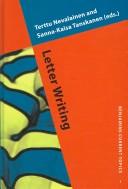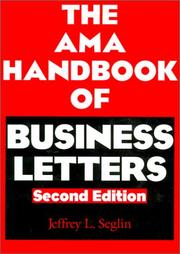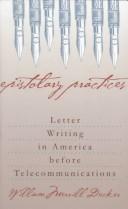| Listing 1 - 10 of 60 | << page >> |
Sort by
|

ISBN: 1282155121 9786612155123 9027293007 9789027293008 9027222312 9789027222312 9789027222312 9781282155121 6612155124 Year: 2007 Publisher: Amsterdam Philadelphia J. Benjamins Pub. Co.
Abstract | Keywords | Export | Availability | Bookmark
 Loading...
Loading...Choose an application
- Reference Manager
- EndNote
- RefWorks (Direct export to RefWorks)
The article deals with correspondence in natural history in the eighteenth century between England and North America. The corpus discussed consists of correspondence between John Bartram and Peter Collinson, and between Alexander Garden and John Ellis. The approach used in the study is qualitative and rhetorical; the main point considered is how the letters construct scientific centre and periphery in the eighteenth-century Atlantic world. A central concept is the "colonial exchange", whereby "raw materials" from the colonies - in this case plant and animal specimens, along with proposed identifications and names - are exchanged for "finished products", in this case codified scientific knowledge contained in publications.
Letters. --- Letter writing. --- Correspondence --- English letter writing --- Letter writing, English --- Writing of letters --- Authorship --- Letters --- Biographical sources --- Literature --- Letter writing
Book
ISBN: 8431536128 Year: 1987 Publisher: Barcelona De Vecchi
Abstract | Keywords | Export | Availability | Bookmark
 Loading...
Loading...Choose an application
- Reference Manager
- EndNote
- RefWorks (Direct export to RefWorks)
Spanish language --- Letter-writing --- Spanish commercial correspondence --- Commercial correspondence, Spanish --- Letter writing --- Correspondence --- English letter writing --- Letter writing, English --- Writing of letters --- Authorship --- Letters

ISBN: 9789027222312 Year: 2007 Publisher: Amsterdam : J. Benjamins Pub. Co.,
Abstract | Keywords | Export | Availability | Bookmark
 Loading...
Loading...Choose an application
- Reference Manager
- EndNote
- RefWorks (Direct export to RefWorks)
Letters --- Letter writing --- #KVHA:Brieven --- #KVHA:Communicatie --- #KVHA:Schrijven --- Correspondence --- English letter writing --- Letter writing, English --- Writing of letters --- Authorship --- Biographical sources --- Literature
Book
ISBN: 0803284160 9780803284180 0803284187 0803266782 9780803266780 0803284179 9780803284173 9780803284166 1496206398 9781496206398 Year: 2015 Publisher: Lincoln University of Nebraska Press
Abstract | Keywords | Export | Availability | Bookmark
 Loading...
Loading...Choose an application
- Reference Manager
- EndNote
- RefWorks (Direct export to RefWorks)
A history of love and courtship in Mexico from the 1860s through the 1930s based on love letters preserved in legal cases involving courtship.
Letter writing --- Courtship --- Love-letters --- Erotic literature --- Letters --- Courting --- Wooing --- Betrothal --- Love --- Marriage --- Correspondence --- English letter writing --- Letter writing, English --- Writing of letters --- Authorship --- History
Book
ISBN: 1317141946 1317141938 1283859726 1409445364 9781409445364 9781409473145 1409473147 9781283859721 9781409445357 1409445356 9781315580135 9781317141921 9781317141938 1315580136 9781317141945 Year: 2013 Publisher: Farnham, Surry, England Burlington, VT, USA
Abstract | Keywords | Export | Availability | Bookmark
 Loading...
Loading...Choose an application
- Reference Manager
- EndNote
- RefWorks (Direct export to RefWorks)
Focusing on six examples of printed letters from the period, in this study Diana Barnes develops a genealogy of epistolary discourse in early modern England. She considers how the examples-from the writings of Gabriel Harvey and Edmund Spencer, Angel Day, Michael Drayton, Jacques du Bosque and Margaret Cavendish-manipulate this generic tradition to articulate ideas of community under specific historical and political circumstances.
English letters --- English prose literature --- Letter writing --- Correspondence --- English letter writing --- Letter writing, English --- Writing of letters --- Authorship --- Letters --- History and criticism. --- History
Book
ISBN: 1785399608 0748692932 0748692940 9780748692934 9780748692941 9780748692927 0748692924 9781785399602 Year: 2016 Publisher: Edinburgh : Edinburgh University Press,
Abstract | Keywords | Export | Availability | Bookmark
 Loading...
Loading...Choose an application
- Reference Manager
- EndNote
- RefWorks (Direct export to RefWorks)
This comprehensive study by leading scholars in an important new field--the history of letters and letter writing--is essential reading for anyone interested in nineteenth-century American politics, history or literature.
American letters --- Letter writing --- Correspondence --- English letter writing --- Letter writing, English --- Writing of letters --- Authorship --- Letters --- American literature --- History and criticism. --- History
Book
ISBN: 1283890062 0812201752 0812221818 Year: 2009 Publisher: University of Pennsylvania Press
Abstract | Keywords | Export | Availability | Bookmark
 Loading...
Loading...Choose an application
- Reference Manager
- EndNote
- RefWorks (Direct export to RefWorks)
In My Power tells the story of letter writing and communications in the creation of the British Empire and the formation of the United States. In an era of bewildering geographical mobility, economic metamorphosis, and political upheaval, the proliferation of letter writing and the development of a communications infrastructure enabled middle-class Britons and Americans to rise to advantage in the British Atlantic world.Everyday letter writing demonstrated that the blessings of success in the early modern world could come less from the control of overt political power than from the cultivation of social skills that assured the middle class of their technical credentials, moral deserving, and social innocence. In writing letters, the middle class not only took effective action in a turbulent world but also defined what they believed themselves to be able to do in that world. Because this ideology of agency was extended to women and the youngest of children in the eighteenth century, it could be presented as universalized even as it was withheld from Native Americans and enslaved blacks.Whatever the explicit purposes behind letter writing may have been-educational improvement, family connection, business enterprise-the effect was to render the full terms of social division invisible both to those who accumulated power and to those who did not. The uncontested power that came from letter writing was, Konstantin Dierks provocatively argues, as important as racist violence to the rise of the white middle class in the British Atlantic world.
American letters --- Letter writing --- American literature --- Correspondence --- English letter writing --- Letter writing, English --- Writing of letters --- Authorship --- Letters --- History and criticism. --- History --- American History. --- American Studies.
Book
ISBN: 9789027256232 9789027274700 9027274703 9027256233 128049753X 9786613592767 6613592765 Year: 2012 Volume: 218 Publisher: Amsterdam/Philadelphia John Benjamins Pub. Co.
Abstract | Keywords | Export | Availability | Bookmark
 Loading...
Loading...Choose an application
- Reference Manager
- EndNote
- RefWorks (Direct export to RefWorks)
In recent years there has been a renewed interest in correspondence both as a literary genre and as cultural practice, and several studies have appeared, mainly spanning the centuries between Early and Late Modern times. However, it is between the eighteenth and nineteenth centuries that the roots of contemporary usage begin to evolve, thanks to the circulation of new educational materials and more widespread schooling practices. In this volume, chapters representing diverse but complementary methodological approaches discuss linguistic and discursive practices of correspondence in Late
Pragmatics --- Mass communications --- anno 1800-1999 --- Europe --- Letter writing --- Written communication --- Written discourse --- Written language --- Communication --- Discourse analysis --- Language and languages --- Visual communication --- Correspondence --- English letter writing --- Letter writing, English --- Writing of letters --- Authorship --- Letters --- History --- Social aspects --- Social aspects.

ISBN: 0585027021 9780585027029 081440331X Year: 1996 Publisher: New York AMACOM
Abstract | Keywords | Export | Availability | Bookmark
 Loading...
Loading...Choose an application
- Reference Manager
- EndNote
- RefWorks (Direct export to RefWorks)
Commercial correspondence --- Letter writing --- Commerce --- Business & Economics --- Business Communication --- Business correspondence --- Business letters --- Correspondence, Commercial --- Business writing --- Correspondence --- English letter writing --- Letter writing, English --- Writing of letters --- Authorship --- Letters --- Commercial correspondence. --- Letter writing.

ISBN: 0807866636 9780807866634 0807824380 0807847437 9780807824382 9780807847435 0807824380 9780807824382 9798890870520 Year: 1998 Publisher: Chapel Hill University of North Carolina Press
Abstract | Keywords | Export | Availability | Bookmark
 Loading...
Loading...Choose an application
- Reference Manager
- EndNote
- RefWorks (Direct export to RefWorks)
Letters have long been read as primary sources for biography and history, but their performative, fictive, and textual dimensions have only recently attracted serious notice. In this book, William Merrill Decker examines the place of the personal letter in American popular and literary culture from the colonial to the postmodern period. After offering an overview of the genre, Decker explores epistolary practices that coincide with American experiences of space, settlement, separation, and reunion. He discusses letters written by such well-known and well-educated persons as John Winthrop, Benjamin Franklin, Thomas Jefferson, Abigail and John Adams, Nathaniel Hawthorne, Margaret Fuller, Henry David Thoreau, Samuel Clemens, Henry James, and Alice James, but also letters by persons who, except in their correspondence, were not writers at all: indentured servants, New England factory workers, slaves, soldiers, and Western pioneers. Individual chapters explore the letter writing of Ralph Waldo Emerson, Emily Dickinson, and Henry Adams--three of America's most ambitious, accomplished, and theoretically astute letter writers. Finally, Decker considers the ongoing transformation of letter writing in the electronic age.
American letters --- Letter writing --- Correspondence --- English letter writing --- Letter writing, English --- Writing of letters --- Authorship --- Letters --- American literature --- History and criticism. --- History --- History and criticism --- American letters - 19th century - History and criticism --- Letter writing - United States - History - 19th century
| Listing 1 - 10 of 60 | << page >> |
Sort by
|

 Search
Search Feedback
Feedback About UniCat
About UniCat  Help
Help News
News